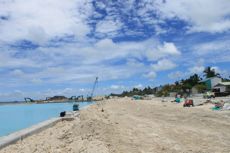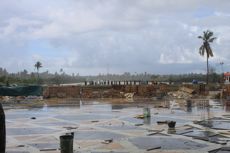The opposition Maldivian Democratic Party (MDP) has now called off the daily protest demonstrations in the capital city of Male’, demanding early presidential polls ahead of those due in July-October 2013.
This in a way has revived the hopes of early resumption of the All-Party Roadmap Talks, initiated by President Mohammed Waheed Hassan at the insistence of visiting Indian Foreign Secretary Ranjan Mathai in March.
More importantly, the agenda for the Roadmap Talks have elements that have the nation’s long-term interests in mind, and on which a certain unanimity has emerged, owing to national compulsions that are for real.
Independent of existing expectations, both within the party and outside, the MDP leadership has gone ahead with the protest rally in the Islamic fasting month of Ramadan.
However with the Eid festival season arriving with consequences for the local community, including trade and business, the MDP seems to have thought better of it. The party said that the decision to withdraw the protests should lead to the revival of the peace talks, in which the MDP’s demand for fast-tracking presidential polls is a part of the agenda.
Reacting positively to the MDP’s decision, the President’s Office said that it would help in the revival of the Talks. Following protests against Vice-President Waheed Deen in suburban Hulhulumale Island, off Male’, President Waheed has since clarified that harassment of government officials should stop before he would consider participating in the talks.
President Waheed said that he was in continuous touch with Ahmed Mujuthaba, moderator for the All-Party Talks. He has also been promised by all participant parties that either their leaders or a senior deputy (with decision-making authority) would be fielded when the talks resumed. Earlier rounds had failed to reach any decision owing to the diffused focus of the talks and also improper representation by the parties.
Interestingly, the influential former President and founder-leader of the Progressive Party of Maldives (PPM), Maumoon Abdul Gayoom, who had refused to return to the talks until his successor Mohamed Nasheed tendered an ‘unconditional apology’ for charging him with a plot behind the latter’s February 7 resignation, has not reacted yet to the protest-withdrawal by the MDP. He was not satisfied with the ‘qualified apology’ tendered by Nasheed’s aides, and has also said that despite the international probe that is now on, he would not accept the ‘coup theory’.
Intermediate confusion however crept in after the MDP interpreted the All-Party Talks being called by Vice-President Deen for resuming the stalled Parliament session, as one leading to early elections. The government has since clarified that the Vice-President’s talks flowed from Speaker Abdullah Shahid’s decision to indefinitely suspend the proceedings of the Majlis on July 31, following days of interruptions in the house. In a way, any decision on early resumption of Parliament session will help create the right environment for the revival of the Roadmap Talks, too.
Will the CoNI report come in handy?
Independent of the agenda-point on early presidential polls, the Roadmap Talks concerns national priorities that have been overtaken time and again by the political developments of the past years. On presidential polls, there is a general agreement that the international probe by the Commission of National Inquiry (CoNI) appointed by President Waheed, holds the key. The probe, with a retired Singaporean Judge on board, is expected to submit its report by the extended deadline of August 31.
Some government parties have since murmured their protests about the inclusion of an MDP nominee in the probe. Yet, they did not contest the nominations when the government – of which they were all a part – made its original nominations.
However, there is a greater realisation that any advancement of the presidential polls can be done only by Parliament amending the Constitution through a two-thirds majority, or by President Waheed quitting office, based on a public statement to the effect after the MDP flagged the ‘plot theory’ in the aftermath of President Nasheed’s resignation.
In the latter case, too, there is no constitutional guarantee to the effect, nor is the constitutional position clear. Under the law, the Vice-President steps into the shoes of the President, as Waheed did, and unless the former too quits, there be no case for early polls, it is argued. Under the Constitution, the Parliament Speaker takes over if the top two jobs become vacant, and has to conduct presidential polls within three months. Whether the CoNI report could lead to such a situation, or if the MDP would return to the streets, either way are questions for the future.
Commonality yes, consensus, not yet
On larger issues that have been flagged at the Roadmap Talks, there is some commonality of approach in individual parties, and across the board in many others. On the issue of early elections, for instance, the Dhivehi Rayyathunge Party (DRP), which is a partner in the government, has said that it would support the MDP position (without saying so) if the CoNI report endorsed the ‘plot theory’. With the DRP’s backing as the party-wise position in Parliament now stands, the MDP could hope to get the Constitution amended to facilitate early polls. But there are ifs and buts there too.
However, a consensus of sorts is required to emerge, at least among the major political players, if only to ensure stability of the polity and continuity of policies, independent of the party or leader elected to power. It would be more so considering the inherent inability of the Maldivian polity to throw up a strong president with a first round victory for self on his own and his party’s steam. Worse still would be the situation of the kind that haunted the Nasheed presidency, when the government party did not enjoy a parliamentary majority, required for amending laws, reflecting the political agenda and electoral manifesto of the president or of the parliamentary majority – whenever it cannot be both.
On governance issues, on which the MDP had quarrels with the rest of the nation’s polity even while President Nasheed was in office, the party may be tempted to have a relook at its position since. For instance, the Civil Court and the High Court have consistently come down on the Maldives Police Force for forcing the MDP cadres out of their Usfasgandu ‘camp site’ in Male. A legal row has emerged between the government and the MDP-controlled Male Municipal Council over the usage of the Usfasgandu property, taken out on lease by the latter.
The MDP thus may have to relook its position on institutional reforms. In the case of the judiciary, for instance, the party should wait till the seven-year deadline for empowerment and training ends. Having talked about institutional reforms much while President Nasheed was in office, the MDP should instead be working on a roadmap with specifics on training and legislation, possibly as a part of its promised poll manifesto.
On other issues of common concern outlined in the agenda for the Roadmap Talks, economic issues take a high place. Independent of what individual parties have to say in public, there is a general acceptance about the need for relooking at the budget and economic issues. If the Nasheed Government was vociferous in proceeding with economic reforms, subsidies-cut and increasing the tax revenue to the government, the successor Waheed government has proceeded on similar and at times stronger lines. Government leaders are not shy of talking about austerity measures, and government parties cannot change halfway through.
On the equally sensitive issue of allowing resorts on inhabited islands, which was among the charges levelled against the Nasheed Government, the Waheed presidency has since granted permission for allowing a third party to set up a resort on Thanburudh island training and recreation facility of the Maldivian National Defence Force (MNDF), the nation’s army.
While it may be a stand-alone case, compared to sanction for resorts in other inhabited islands, the question remains if that third-party could involve overseas investors or partners, in the context of the controversy still surrounding the ‘GMR contract’ for the airport project.
In this context that the Waheed Government’s current initiative for amending the Finance Act, to give the Executive freedom from parliamentary oversight and passage for selling public assets to private parties assumes significance, in political and economic terms.
As may be recalled, Parliament rushed to amend the Finance Act in 2010 after the Nahseed Government had entered into the Male airport modernisation contract with the Indian infrastructure giant, the GMR Group. It is another matter that the GMR contract did not involve the sale of any Maldivian Government assets, yet the otherwise divided opposition of the times, all of them now on the Treasury Bench, joined hands, among other things, to depict the modernisation contract as an ‘assets sale’.
Questions also remain about the wisdom of the present government entering into a joint venture with the MNDF, for the new company to enter into businesses and investments, to augment the budget for the nation’s defence forces. Experience elsewhere in South Asia too has proved that independent economic resources in the hands of the armed forces, if only after a long time, have made the services independent of the nation’s political and bureaucratic leadership in other ways, too.
Though not mentioned in the Roadmap Talks, such are also issues on which a national consensus needs to evolve, and clarity and consistency thrown into the operationalisation of whatever decision that is arrived at.
All comment pieces are the sole view of the author and do not reflect the editorial policy of Minivan News. If you would like to write an opinion piece, please send proposals to [email protected]
The author is a Senior Fellow at the Observer Research Foundation.
Likes (0)Dislikes
(0)Dislikes (0)
(0) 

